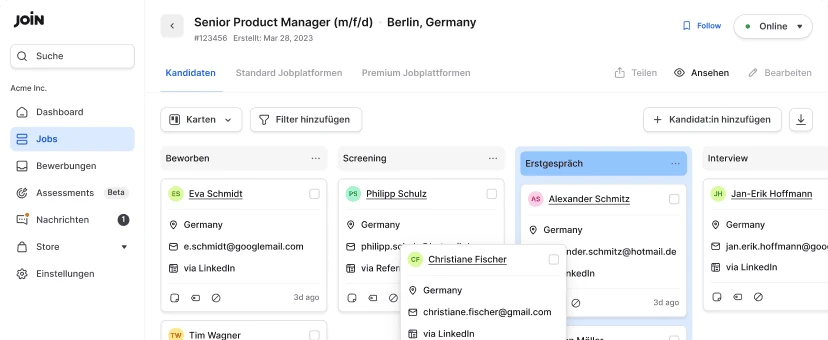The future of recruiting: 6 predictions for 2023
As we enter 2023, the world of recruiting faces changes and focus shifts. In this year’s recruiting trends report, we dive deeper into the topics that will likely shape the year(s) to come in terms of hiring, recruiting, and the state of the labour market.
Table of contents
Note that this is the version of our predictions for 2023. For the latest predictions for 2024, see our article on recruitment trends in 2024!
Our recruiting predictions for 2023 include an increased emphasis on technological advancements, team diversity, and the ongoing debate regarding hybrid vs. remote. As a recruiter or hiring manager, it’s important that you stay ahead of the curve on the latest shifts in the recruitment process.
Below, you will find 6 of the biggest trends that will likely define the recruitment world of tomorrow. You will also learn about 2 key factors that are expected to be a driving force behind 2023’s recruiting trends and changes.
And of course, we’ll give you actionable tips to prepare your business for the year to come. Let’s dive in!
Two key factors driving change
Although many factors will contribute to the shifts we’re about to see in recruitment and HR, two of them will likely have the highest impact.
Firstly, changes in the global economic and social climate will keep the world in their grip. We are still experiencing the effects of the COVID-19 pandemic throughout society. Whether it’s ongoing supply chain issues, an overburdened healthcare system, or the continued struggle of employers to get employees back to the office, the pandemic’s aftermath will still be felt in 2023.
In February 2022, the Russian invasion of Ukraine and the resulting crisis added fuel to the fire, with rising energy prices and inflation hitting the global economy hard. According to Forbes, most analysts are expecting a recession in 2023. Hiring freezes, mass lay-offs, and uncertainty have been the result.
Secondly, the labour market is starting to witness a generational shift: the entrance of Gen Z and the exit of the Boomers. As members of Gen Z (those born roughly between 1997 and 2012) begin to enter the workforce, they bring a unique set of skills and perspectives that are likely to have a significant impact on the recruitment industry.
They are the first fully digitally generation, growing up in a society globally connected through technology. Furthermore, studies into Gen Z expectations and behaviours suggest a shift in working life preferences compared to other generations, such as the need for more flexibility.
We’ll dive more into some of these shifts below.
6 predictions for the future of recruitment in 2023
So how do these two main factors affect the way you do your job as a recruiter, hiring manager, or business owner? What are the areas you need to focus your attention on to ensure that your organisation and recruiting efforts don’t fall behind in 2023? Below, we list our top 6:
1. The increasing importance of AI and automation
Hung Lee, curator of the weekly Recruiting Brainfood newsletter, asked fellow recruiting professionals the question: “What do you think will be your No 1 recruiting challenge in 2023?”
At the top came “doing more with less”. As Lee explains “we recruiters are expecting to ‘do more with less’ and are highly interested in how we can become more efficient as departments and as individuals”. You can find the full issue in which the poll featured here.
With the impending recession and general financial uncertainty, companies are desperately looking for ways to become more lean and efficient in their processes. And one of the most trending ways right now to achieve this goal is using automation and artificial intelligence.
The number of technological tools and recruiting software like JOIN at our disposal has rapidly increased over the past years. And the latest powerful Generative AIs, such as Lensa AI or ChatGPT, can help us create full texts or images in a matter of seconds.

The role of AI and automation is expected to grow even further in 2023 as businesses and recruiters try to optimise and streamline their processes every step of the way.
Read also: How to make AI part of your recruitment strategy
2. Broaden your search
Finding top talent, especially in technical roles, has become tougher and tougher over the last few years. A skills gap has emerged that will most likely keep widening in the year ahead.
In other parts of the labour market, such as the earlier mentioned supply chain, global labour shortages further widened the divide between the number of workers and the demands of businesses.
Due to the tight market and the struggle to find top talent, recruiters can no longer focus their efforts only on the same job boards and channels as they used to. That’s why a second trend for 2023 is to keep broadening your search with different channels and tactics to reach qualified candidates.
We’ve already seen a big rise in global recruitment, and this is expected to only grow further. Moreover, recruiters may have to become more creative and think outside the box when it comes to which channels they use.
For example, why not consider a niche job board like Workeer to find qualified talent with a refugee background? Or organise a hackathon to attract tech talent!
Need some job board inspiration? Be sure to check out our list of the best job sites for 2023.
3. Hybrid flexibility is key
Back in 2021, business leaders were worrying about how to get their employees (safely) back to the office as COVID-19 restrictions were slowly lifted. Would employees accept having to come back in, now they’d gotten used to working from the comfort of their own homes? The new generation of young Gen Z’ers in particular was expected to demand remote work by default.
The good news for those business leaders? The majority of Gen Z professionals still prefer in-office or hybrid work over being fully remote, as this Deloitte research found. But that doesn’t mean the workplace is expected to return to pre-pandemic patterns.
Instead, the future is hybrid and hiring managers will need to keep this in mind in 2023. That’s because, in most cases, the recruitment process will likely take on a hybrid nature as well. This means hiring managers need to be prepared for both in-office and fully remote interview and onboarding processes.
Once hired, employees expect a flexible workplace where they can decide for themselves how to organise their working life. Work-life balance and mental health are top-of-mind, especially for younger professionals, who disproportionately struggle with depression and anxiety.
If you’re not mindful of these preferences as an employer or hiring manager, talented candidates will look for a job elsewhere. Being flexible and open towards the needs of candidates and employees will be crucial in the competitive talent landscape expected in 2023.
4. Employer branding is no longer a nice-to-have
Closely following the previous point: the workforce of tomorrow demands more from employers. If a company doesn’t align with their values or needs, they will try their luck elsewhere.
That’s why 2023 should be the year to build a strong employer brand (if you haven’t already). And recruiters play an important role in ensuring that both potential candidates and existing employees alike have a positive experience engaging with your company.
From having a smooth and optimised interview process to representing the company at industry conferences and events to increase brand awareness, in the year ahead, employer branding is no longer just nice-to-have, it’s business critical.
5. Double down on DEI
Another major trend that will only grow as Gen Z enters the workforce is the importance of diversity, equity, and inclusion (DEI).
Employees today are not just aware of societal and workforce issues related to these topics. They will actively shy away from companies that do not invest in building a workforce where everyone is treated fairly and equally.
Tiffany Mawhinney and Kimberly Betts at Deloitte explain in their article Understanding Generation Z in the workplace:
Diversity is the watchword for Gen Z. [It] matters to them through many dimensions, not just isolated to race and gender but also related to identity and orientation. Companies that can better represent the spectrum of differences in their external branding/marketing are much more likely to diversify their talent pipelines.
No wonder DEI initiatives are now present in all Fortune 100 companies. And recruiters and hiring managers are at the forefront of many of these initiatives. From posting job ads to diversity job boards to source and attract more diverse talent to attending diversity-focused events.
If you aren’t incorporating DEI into your recruitment strategy, you are likely to lose out on top talent.
6. Adaptability and agility are key
Most of the predictions mentioned in this article are clearly actionable points. They are aspects of your business you can work on and improve or maintain. But even if you excel at all of the above, new developments (societal, economical, or technological) can still throw a spanner in the works.
And if we’ve learnt anything in the past years, with sudden seismic shocks like the COVID-19 pandemic or the Russian invasion of Ukraine turning the world of work upside down overnight, it’s that we never know what the future holds. Let alone how new technologies like AI might alter the way we recruit and hire.
No wonder that LinkedIn’s Future of Recruitment report found that keeping up with rapidly changing hiring needs will likely be the number one priority for recruiters over the next 5 years.
The adaptability and agility of a business and its hiring managers is likely to make the difference between flourishing or failing. That’s why our final recruitment prediction for 2023 is that in order to succeed as a recruiter in the year to come, you will have to adopt an open mindset that sees opportunity in change. Now more than ever.
Furthermore, it also means the role of recruiters is changing. Recruiters are increasingly the drivers behind business-critical initiatives. That’s why recruiters will transform from order-takers in charge of finding and interviewing candidates to shapers of the strategic direction of a business.
In the book Transforming Human Resource Functions With Automation, Tristan Klotsch, Vice President of HR at Serrala, stated that “in the future, recruiters will look more and more like HR business partners.” And although from 2020, this quote seems even more relevant as we enter 2023.
Forward into the future
The world of recruitment is always changing, but the global events of the past years, the current state of the economy, and the onset of a generational shift have rapidly accelerated this.
It can seem like a daunting task to try to keep up with these changes. But by keeping a close eye on trends and actioning the tips we’ve highlighted above, you will be one step closer to future-proofing your recruiting efforts.
Need more inspiration to help you grow further? Then check out our article with the 14 best ways to attract top talent in 2023
Frans Lelivelt
Frans is JOIN's multilingual Senior Content Manager. His main topic of interest in the recruitment space is DEI and how companies can reduce their (unconscious) biases to make the world of work a fairer, kinder place for everyone. Outside of work, he tries to do the same for animals, spending much of his spare time in the kitchen preparing plant-based feasts.


